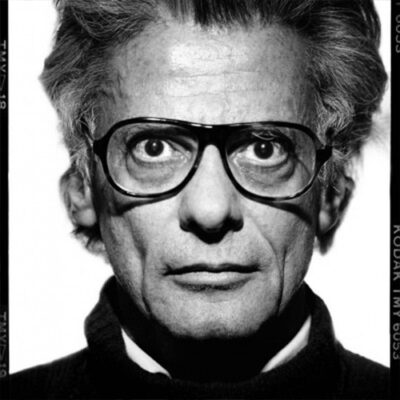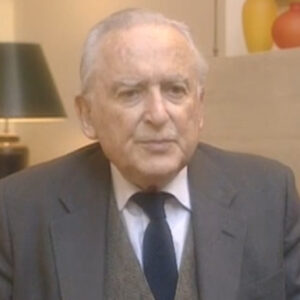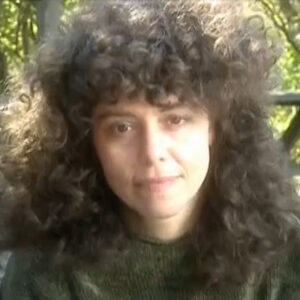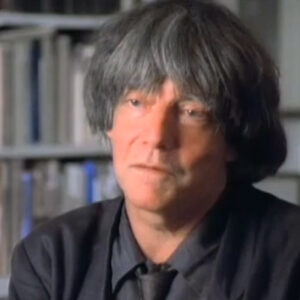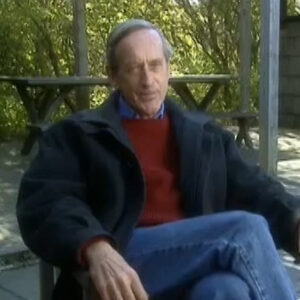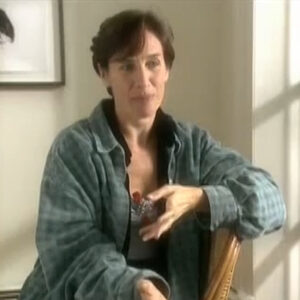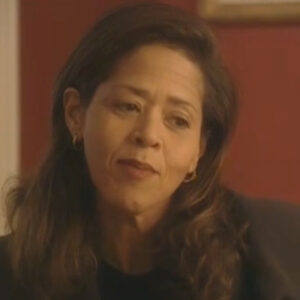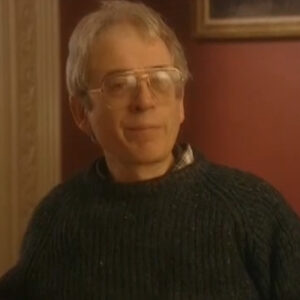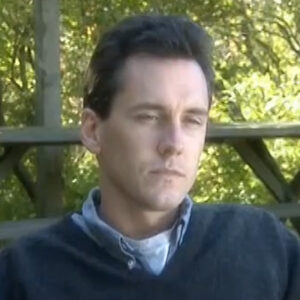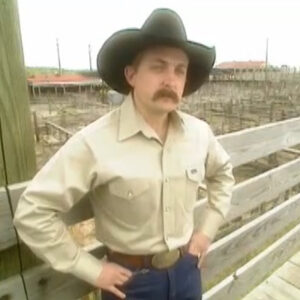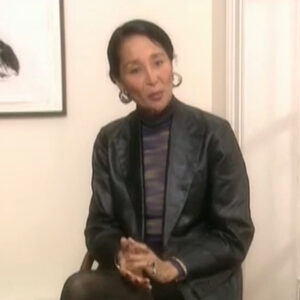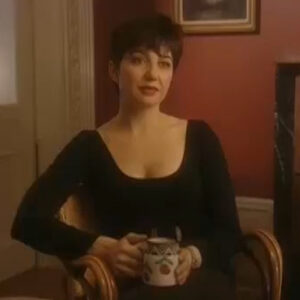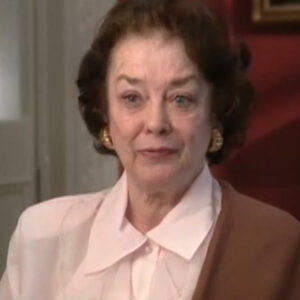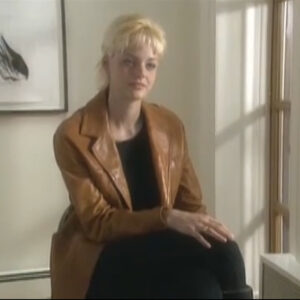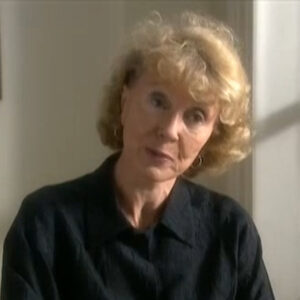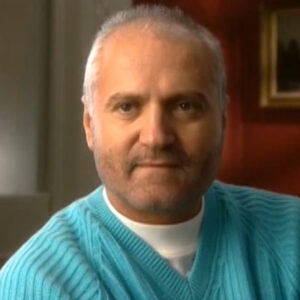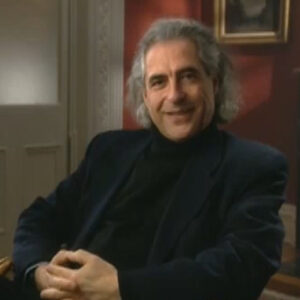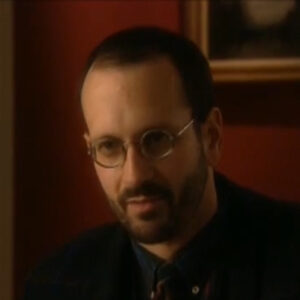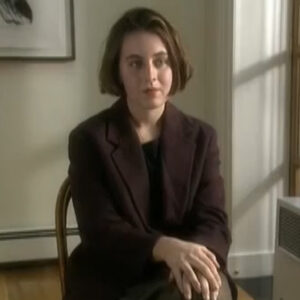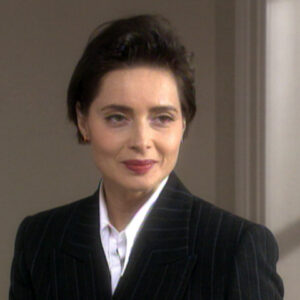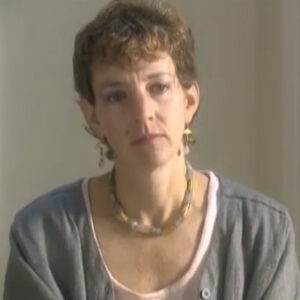Speaker Uh, Pennypacker. Barbara Kopple, Fred Wiseman, uh, we were all looking at, uh, Dick taking for weapons. So you took a number of them and suddenly he cut something that I was quite, uh, uh, habit of mine, of mine to hold my hand. It’s a rather unusual way. And that’s someone that made it to the magazine. And, uh, while he was on to something in a way. Know how other people interpret it. But I’ve noticed myself when I’m taking photographs, uh, taking stills not professionally, but just all through my life. And, uh, so many of the photographs I’ve taken, um, that post. But I always seem to find a moment when someone in the photograph is holding his or her hand that way. And it’s, uh. I thought about. Oh, my. My sister Barbara was, uh, born with a defective arm so that all her life, she held it that way. And it was my way, I guess, of, uh, uh, identifying with somebody I love a great deal. Uh.
Speaker I hadn’t not look at the photograph. Uh, and, uh, it does have actually all the skin tones. And, uh, I guess my memory was a Xerox of it, which, uh, so that the faces were all white. And that, I suppose, uh, proves the point. You know, photographs have got to be reproduced. Exactly. Right. Or you missed the whole point. You get into another territory. And, uh, uh, in documentary filmmaking, what appeals to me is the exact truth. It’s not that you get it right. You get it just exactly right. Or you should be out of that business. And, uh, whatever else you might think of Avenal photographs. No one can deny that you’re right there. I mean, it’s more real than than just about any other photograph.
Speaker Uh, um, so utterly real.
Speaker So, uh, uh, so much something frequent, a confrontation, uh, that people will say bad things about the photograph because they want to deny that that reality, uh, they don’t want to confront another person or since a photograph really does two things. A good photograph.
Speaker Well, either or both, uh, put you in confrontation with the other person or confrontation is so strong that you see yourself in that other person.
Speaker What what a wonderful, uh, exciting, uh, uh, profession or genre. Uh, to be engaged in that. You can you can, uh.
Speaker Bring forth the presence of that other person so accurately. Such exactitude that that person is really right there forever. And because it is of the image will always be there. Uh, it it’s both, uh, an exact, uh, uh, moment in life. And because it doesn’t move at all else. It also is an expression of that which is kind of scary. Uh, his focus is, uh. Because they have these wonderful qualities, the scary, very scary to see yourself, uh, stripped, uh, and exactly every little blemish and everything of, uh, a beauty, if it’s, uh. Uh. All kinds of things at scale age. Uh. Uh. Are you wearing the right clothes? You know, if you’re the kind of person that doesn’t have a tolerance for, uh, unconventionality, you know, you’re looking at everything here. Um, you put off by the exactitude. And, uh, um, no, it’s not a problem. It’s the problem. The person looking at the photograph or the person who is in that photograph. Uh, anybody does any work about who’s got it? Perhaps the man. Anybody that looks at the painting or the photograph, you know, that they have, uh, some kind of tournament’s, uh, except just about, uh, think it’s true about themselves. And that’s, uh. Yeah. Tab either. Yeah. You you have to be very mature. You have to be you have to be young enough to have the innocence that, you know, uh, have the sophistication to be uh, uh, troubled by, uh, the complexity of, uh, of life and the, uh, presentation of, uh uh.
Speaker Uh, stuff, much of which we try to hide away from. Talked about the reasons that this particular report can give you. All right. So what would be my answer? Yeah. A photograph of me.
Speaker You don’t really think too much.
Speaker Except for me, it was very personal. I love that I am being held that way. Uh.
Speaker I wasn’t thrusting my jacket. It wasn’t Napoleon. Uh, um. It, uh, it put my sister into the picture, too. For me. For others. I don’t know. It also had a nice effect, that sort of breaking up, uh, these four, uh, column like figures. Something something went the other way. So it may just have been that simple. As to why he saw that. And, uh, uh, uh, uh, uh, keep that pose. Uh.
Speaker It’s going to be interesting.
Speaker Well, it would have had a much easier time.
Speaker Revealing a lot about me. If I were filming, if I were with my, uh, a member of family, uh, in other words, in a uh, in a real life context outside of the studio, much, much easier for me would have had, uh, you know, the greatest they say, the greatest collaborative. All one is on his side embellishing the photograph. Uh, in a real situation with other people in my studio with pictures around me that are so characteristic for me. Oh, well, that helps to tell a story. But he chooses, uh, to take the the road not taken very much more difficult. And, uh, at times, uh, makes his pictures. Uh. Uh, that’s unsuccessful. Uh uh. But when it works at, uh, as it did for me in the Oliver Stone photograph, uh uh, there it was. I read the piece by a very good writer with, uh uh, it’s one of the best profiles I’ve ever read, I think, by Oliver Stone. And, uh, I thought I know him very well from eating the piece. And I looked at the photograph and the piece didn’t achieve what might be most important. And that is to put me right smack up against this man who I felt was, uh, you know, could really hurt me. How can a photograph have that kind of power? Have been onto something. And, uh, and, uh, what he was after was he he caught him at a particular moment where he just showed everything that the profile was as good as you can get, I guess, with words. And the photograph was as good as you can get with a camera. And, uh, now, if he got all of the stone in another setting and reality in that particular instance, I think that, uh, the context would have deflected from the power of, uh, this man’s killer instinct. I’m talking about Stone. His, uh, you saw a fugitive. Uh, you saw somebody who could be it could be a stalker. He could he could very well be looking at you at the moment of the kill and you’d be the one you’d be killing.
Speaker I can imagine a photograph could do that. Well, his photo. Yeah.
Speaker And I don’t know that, uh, any other photographer or any other device or any other, uh, context could have made it more powerful. I think in that particular instance, anything anything that might be going around him that would be included in the photograph would be, uh, and this is very it would be a distraction from from the confrontation, which is so, um, demanding. You can’t look at that photograph without looking back at it. Is there. I’m here. Wow. So I think he’s just leaving this that I am a person always makes, you know, I earned my money and I, uh, my reputation by making movies. And I found that photograph, uh, more powerful and more of what a motion picture is supposed to do.
Speaker And it’s it’s only a photograph. Uh. And in a way, it was for me that he or anybody might think of it this way. But it was the it was the ultimate defiance of all of the stones, uh, the whole being as an artist in that everything moves fast with all kinds of tricks and devices, uh, in a stone in all of this movie, Natural Born Killers to 2005, Eric Cuts. Yeah. Yeah. Everything is moving so fast when it’s all over. I don’t know, uh, that you everything is any of your stuff, your mind. Then you have this… This one so far away. Half of all you’re looking at looking back at you and you can’t get away from it. Inescapable.
Speaker Movies have not been at their best all the years because it’s always there’s always been that presumption, at least, uh, for those who distribute the films that a movie is supposed to provide for an escape. But, uh, to my mind. Of course, the strongest ones grab hold of you and you can’t escape from that photograph.
Speaker Inescapable.
Speaker Ow, ow, ow.
Speaker Well, um, if I be curious, you’d have to almost do a scientific study to, uh, to put the photograph in front of a control group who hadn’t read the article and see what they got.
Speaker That might be interesting. So not having that kind of study, I don’t know. Um, when you read the article, uh, you surely saw that face, um, a fugitive stock or a killer? Um, um, in the article, you find out that he has killed somebody, uh, in war.
Speaker You have you found you have found out that on his own volition he joined the air, uh, services and went to Vietnam. Uh, and quite clearly, he has a obsession with death and killing. Uh, uh, I’m confused. I would say, uh, confused values. Uh, on the one hand, he seems to be somebody with, uh uh.
Speaker He thinks of himself, I suppose, somebody with a passion and needs to tell the truth about something that happens to be called Demons Society.
Speaker Well, that’s a demonic person that’s in front of you.
Speaker That’s the beauty of it is, you know that. That if there is that apana has proven that a still photograph without moving could move you more than a motion picture.
Speaker You are the one that’s moving forward. And it used to be used to be that people like Magic Ray. They made their movies. And so, for example, they made their movies, um, where almost nothing was moving around for a long period of time. You gave you gave you the opportunity to ponder. To think if people think that as they I’m sure. The rabbit on this brutal and cruel. Um, well, what is kindness? Uh. If a photograph is kind and unrevealing, if that’s what it takes to be kind, then, uh, I want to I wouldn’t want to have any partner.
Speaker I think that, uh, um, we get confused.
Speaker We think that, uh, that, to be honest, is to be brutal, to talk about, uh, brutality and frankness. And, uh, we worry about involvement, uh, that, uh, vulnerability worry that someone’s gonna get hurt. Well, if somebody is vulnerable by exposing themselves, uh.
Speaker They take a chance. But, you know, that’s life. If you don’t take a chance and don’t don’t move and hide away and keep all your secrets and don’t let up. Have it all come along and photograph you. Uh, let me simply say, the only safety, the only way to be totally safe. Are not yet on. Not yet. He’s my boss and actions are not yet born.
Speaker So interesting. Why don’t people talk about that.
Speaker Wait out. Props. How it didn’t work. What did you feel you ultimately revealed? Why did you use the words not to hook you? It wasn’t right. It wasn’t for him. So whatever your reasons were sort of a discussion of the white background. That means that props to him.
Speaker Well, he’s he’s obviously taken a very difficult task. He’s got his hands, uh, with one hand tied behind his back. And because he doesn’t have the collaboration of reality context, he’s stripped everything away. And all he’s got is, uh, is a face and a body. No background. I think it’s white and black. Uh, nothing else. Uh, I suppose you might say for him to use as a crutch. It’s perfectly legitimate. Uh, and, uh, most photographers, uh, do their best, uh, using the context that he has is very daring. And, uh, it would be too scary for, uh, just for any photographer other than Abbadon to restrict restrict himself that way. Uh, and, uh, so he’s very courageous.
Speaker And, uh, it doesn’t always, uh, um, yield, uh, as much as another photographer, uh, taking a photograph in a Real-Life situation. Uh, uh, the, uh. Say, for example, where you were.
Speaker Yeah.
Speaker Well, uh, for me, as I look for the photograph, uh, uh, I must say that I if I felt that, um, my my colleagues, the other three in the photograph, uh, didn’t fare as well as I did in terms of, uh uh. Not looking at best. Penny Baker look sort of scary, but I’ve seen I’ve seen that sort of look. Obviously, it’s not that it’s out of thin air. Uh, Barbara looks, uh.
Speaker She’s not the charming Pirbright that we’re used to. Uh, uh, Fred. Oh, uh.
Speaker Myself, um.
Speaker What I liked was that, uh, uh, I with such a, uh. It’s stark proximity to the to the viewer, that confrontational photograph that Iran presents. I didn’t. I didn’t. I myself. Picking. Oh, uh, look. All right, look. I couldn’t I couldn’t fault it for any kind of, uh, silly, uh, kind of an imperfection. It was it was, uh. But it just.
Speaker Uh.
Speaker I’ve seen other photographs for myself, and there’ve been occasions when I’ve been filming where people were filming me at the time. So I know myself and photographs and then film. And there are qualities that I’ve learned from those images about myself that I never would have known.
Speaker And yet their primary characteristics, for example, of a person who comes across is much more naive. Right. What would have imagined without the aid of the movies and still taking. Well, I don’t see. I don’t see any of that in the photograph. Um, uh, I’m I’m a family man. I’ve got, uh, uh, a lovely, very, very interesting life. Uh, the fact that I chose her and she chose me.
Speaker Uh, uh, you put the two of us together and, uh. Wow. It’s like going out to help you out. I understand each one of us. Our relationship. Uh, put me with one of my kids. Are the rest of the family.
Speaker Uh, it tells you everything about my age and about puberty and about, uh. On and on and on. And, uh. Well, what what a challenge for for Dick to just take me along. Well, come to think of it, um, maybe in the context of these other filmmakers, uh.
Speaker The way the way, uh, I appear maybe to the strange looking at the photograph, uh, maybe it might say something about me that, uh, you know, made the presence of these other people.
Speaker Uh, the pose sort of reminded me of, uh, of the classic photograph of, uh, Sigmund Freud, uh, where these various looking, uh, looking at you. Uh, quite strongly with a cigar. So it’s here and it’s pretty much. Yeah. Smoke cigars. But, uh. Yeah. There’s something you’d look at Freud and you. You, uh. That’s the best part of it. Yeah. And uh.
Speaker So for me, for me it maybe it means more. Uh, I found myself reading into it. Uh, somebody who could have been uh.
Speaker Well, first, um, uh, the photograph of me is with the photograph of me is, uh, like so many other photographs, uh, white background, no context.
Speaker Uh, in that particular case, uh, I’m sort of open show for consideration. Raewyn So looking into uh which is very kind, uh, makes people considerate, which is a good virtue. Uh. And uh and then this photograph of all of the stone guy. Yeah. My consideration. Completely overcome by all these strong emotions of, uh, confronting somebody. Uh kill me. I always looked good. Uh uh you could see. Be my stalker. He could then run away as a fugitive. He’s on the run. Uh, that’s where I got that. Uh, it spoke, uh, immensely of, uh. All of these characteristics, uh, that are in the, uh, written piece. No, I don’t know if, uh, I knew nothing of this man.
Speaker My hunch is that I would still get those qualities that I never saw before. I knew nothing of him. I’m looking at a killer.
Speaker What is it? What these kids. Oh, um.
Speaker Uh oh, the stone is. Such an energetic, vibrant person with all of these energies that if anything around him would just be a distraction. It would make for a lesser photograph, if you want. As I think they would like to have it, you know. Did you feel the power of that face then? He did exactly the right thing. Nothing else. Nobody else. It’s just you. And, you know, all this stone is very, very much an individualist. Nobody can keep up with him. No one can run after him. No one can stop him. And if they’re in his way, they’re in danger. And all of that danger and violence. How do you know it’s in its films and it’s in him. It’s in that photograph. And if there’s anything wrong with the photograph, it’s, uh.
Speaker With this demon. That might be the first one to admit you sent him.
Speaker I don’t have a ton. Who some people think of as being a roguishly. Frank. And that’s his frankness, his honesty, his.
Speaker The confrontation that he presents to you. That’s evidence to the world. And, uh. Uh.
Speaker That’s a great photograph, in fact, but what I love about that, when I so much like about that photograph is that because some people will look at it and say, oh, well, it’s like a passport photograph because it’s a mug shot. Am. Because it comes so close to not being photographed just being a snapshot or a passport for. Because it comes so close. It isn’t. It is. There you are. You’ve got it right. They’ve got the distance between, uh, a snapshot. And if you’ve got you, you got all the reason, the world, you examine that photograph, considerate, uh, to to know that one photograph. What makes a photograph a work of art. That’s what it is.
Speaker Doesn’t this?
Speaker This particular case, the white background. Doesn’t let all of us do. He’s hurt you as a viewer, ya?
Speaker Yeah, I know how you look at that photograph. The human being and not be haunted by that photograph to the rest of your life. See it. It grabs you not as a piece of attention from which you can walk away. That grabs it holds onto you.
Speaker Yeah, oh, yeah.
Speaker Now, uh, the photograph that was taken to me. Uh.
Speaker Didn’t I? I didn’t feel that showed that very much right. And I felt right away. Well, maybe maybe there’s a case where you need the support of some elements of my life, like movie camera, how I behave with it. Uh, uh, so there’s a photograph that was taken of my brother, myself, and, uh, which came to my mind. You know, even see my face, really, because most of it is behind the camera. But there’s some expression, a use of my hands. Uh, that, uh, shows that I’m a.
Speaker I do.
Speaker Who has very gentle caressing of the lands, which is the extension of my. Yeah. That you can’t see. Uh, obviously I’m just raptured.
Speaker Uh, and again, it isn’t is this this is another way of saying that Avidan is right. Maybe because the photograph just takes a hi. That is not open to you. Roll with it with that. Yo, yo. You have seen me at all here. It s the opposite of Abidjan, but it proves his point. You have the same you, but you’ve got you have my emotion. You have a you. Here’s a guy that loves what he’s doing. He must be getting. I’m very curious to know what is it that he’s filming. And that is that how if he faces that, is that it. Oh. Uh. Is how he works. Wow. I would love to have him photograph me. Um, but all that is inherent in this photograph. And you’ll even see me. Uh, so, you know, there’s something paradoxical here. This is not a photograph that I’m aware of, but it proves it proves his point. Because, uh, you know me and you’re not even looking straight on. I mean, I’m I’m not looking straight.
Speaker Are you okay? Yeah, yeah.
Speaker Yeah. Well, it seems the way you feel. Well, um, I don’t know.
Speaker Say, okay.
Speaker Um, well, it proves I have a point in that the photographer doesn’t have the, uh, assistance of me looking right at you. It’s, uh, uh.
Speaker You haven’t seen me, and yet you’re experiencing the joy that I’m experiencing. Get that feeling. You get that feeling. Oh, yeah, there’s a smile. Probably sort that comes across your face because. Because obviously the lighting and what I’m doing.
Speaker That’s true. But that’s a little confusing. Talking about the way in which is just the texture, the props in case it does work. Tell us about that. Yeah.
Speaker Well, obviously, um, I don’t have a tie, so I’m informal. Uh uh uh uh.
Speaker A hard worker. My sleeves rolled up. Particularly care about being somewhat disheveled. We never run a comb through my hair. It’s all over my face. Uh. That’s how the end is progressing. All right. I love what I’m doing, and I also have tremendous respect for the instrument, what it can do. Uh. There’s a lot there’s a lot there that you can read into it that is, uh, that make believe that it’s quite authentic. And, uh. Now, if this were Abidjan’s studio, I put the camera down and walk over, I’d be instructed to walk over to where the light is all up and no background and I’d be looking. Right. Right. But, you know, I probably would change my clothing perhaps, uh, if I didn’t comb my hair. Someone would have told me perhaps to show what you might have. And, um.
Speaker It might it might not. I don’t know. He might not. Might have. Might be able to pull it off. Uh, I don’t think he got enough in the photographs. They took me away. I like this picture. Uh.
Speaker But, you know, if you call me another sitting, uh uh, I’d go.
Speaker I mean, it is. You can call me anytime.
Speaker Yeah, see, now, as I look at the photograph that Jake took of me.
Speaker I remember exactly what I was thinking at that time. I was. My mind was going back and forth like a seesaw. What? What’s in his mind? What’s in my mind. And, uh, uh. I think that on balance, I was more interested in what might be in his mind. Uh, because I was quite willing to let, uh, whatever affect my mind might have on the appearance of the photograph, just right along its own cause.
Speaker I was, uh, it’s hands and, uh, in my.
Speaker You say self conscious. Yeah. Yeah.
Speaker Right here I’m devoting myself. To.
Speaker What I might be seeing through it. That’s me at work. Uh. And I know if I don’t see a richer I know what I was thinking at that time. Except the eye obviously expresses the. The kind of joy that you feel when you get when you’re getting something right. Exactly right. Which, of course, is. What I think is at the heart of what makes a good documentary film.
Speaker Characters. Uh.
Speaker But it is odd, you know, that I mean, here you have more to feed on here as if viewer because you’re looking at me and I’m looking back. And that very you know, that helps you hide from things like age and. Penny and I are the only guys without a tie. And I remember no one no one told me how to dress.
Speaker So I am actually, um.
Speaker Less formal than I would be going to IBM or something.
Speaker Ow, ow, ow, ow, ow, ow, ow, ow, ow, ow. This one. Oh. Oh, yeah. This one did, Emily. I began to read and see the first.
Speaker Here’s the first page. So immediately that getting to the second page. There he is.
Speaker Didn’t.
Speaker I took note of the fact that the teeth were there was a gap there. Which is mentioned in the book. But. Didn’t do for me. But when I got to the point in the piece where I saw the second pass, I was stunned by it.
Speaker And then I thought, OK, it’s, uh, I’ve got to play it time. I read the rest of the piece and I’ll come back to this and.
Speaker Good God. I’m faced with.
Speaker With a guy that I didn’t fully recognize from the written word, and now I was being blessed with the opportunity to be in his presence.
Speaker Him confronting me and I had had to deal with this guy. And there is so many still for me.
Speaker But it’s as they say, they’re only but his energy, his, uh, all the qualities that were sort of dribbled out at me through the reading, which took a lot of time, I read slowly, but, um, when I saw this photograph, I spent more time with him. I spent more time with this looking at this photograph than with the, uh, half a dozen dozen of his pages that were written. All right. Information was good, but it it didn’t give me the privilege of bringing me. Exactly.
Speaker In the same room with this guy and probably just, you know, it seems like maybe two or three feet away. Uh.
Speaker Thank you of the. Question of the potential of violence within all of us are strange.
Speaker You know, there’s another there’s another very, very subtle quality of this thing, may I may be reading into something or obviously this photograph means a lot more to me than it might be to somebody else, but not the his head is.
Speaker Is this how this is just the slightest angle so that it’s as though. He has kept this violence, is ready to kill me and so forth. But he’s sort of thinking, can’t you do something? Can’t you do something so I don’t have to kill you? It’s end. There it is. I mean, it’s got to be there. It’s just that slight.
Speaker Uh, you know, uh, obviously this is not something Dick said, you know, well, put your head on the side or something, because if he had said it are way over it. Just that, right? Any time. But he’s he’s willing to yield some tiny measure of, uh. Love, compassion. Oh, you know, I just think you helped me so. Because, you know, uh, people that, uh, battered their wives and, uh, uh, uh, can kill another person.
Speaker Uh, you would like to get the news that, uh, uh, that they don’t have to do this.
Speaker It’s Oliver knows these years. Yeah. There’s a demon in him. He’d like to get exercised, but you can only express what his true feelings are. And then and part of his true feelings are this tiny measure.
Speaker Oh. Can you help me? And, uh.
Speaker Well, I’d like to know about the role of another photographer who can put it in one picture. In one instance. All of the rage. Tiny measure. Which is probably proportionate.
Speaker Correct. Of kindness.
Speaker This man, what it would take to change that abortion, that ratio. I don’t know. But, you know, I mean, it is not is not his therapist.
Speaker He’s, uh, he’s you. He’s presenting somebody, putting that person right. Your and your presence and making you. You have to confront this man. It’s easy and confronting you.
Speaker And, uh, every piece of this man’s all of his emotions. It’s all in there in exactly the right proportions.
Speaker Uh. Got it to me, just right hand. Uh.
Speaker Well, unless Oliver Stone is dishonest with himself at that end and I had to give him credit, I think for that, I think he would. I think he would be inside of it. What he would see unveiling this photograph wouldn’t work. What does he see himself together? How I think and the kindness factor, which is a tiny, tiny fraction here. You would see this guy at another moment where I would like to be that photograph.
Speaker A different photograph company spots some.
Speaker You make reference to that piece on wrap it. Yeah. I think you need it, you know. Uh. Is Julie right? Yeah, yeah. Uh, when did The Dick Cavett Show at the Marlboro?
Speaker I remember, what, 10 or 20 years ago when Dick had a show at the Marlborough, um, suddenly saw this photograph of Joan Leaf. Saw Robert Frank’s wife. And right away, that established me as an admirer of, uh, Jack. Uh.
Speaker There are a few photographers that I think that just, uh. Amongst the great ones I read a copy of, but s Robert Frank. And yet in your magazine piece, uh, Robert was very disdainful of, uh, Dick’s work and, uh, this photograph of his wife should have been in that article because, uh, it was the countermeasure that would have given us a much full view and understanding of what photography is all about. Uh, Robert’s, uh, photography. And it’s the beautiful photograph of a beautiful woman, uh, whose beauty would escape most people because. Well, she ain’t no spring chicken. She’s, uh. She’s not twenty five. She’s not thirty. Uh, I know, but who cares, uh, what you care about if you have any humanity when you see that photograph is, uh the face has such beauty to.
Speaker Uh, cosmetic.
Speaker It’s a lesson in what real beauty is. And, uh, in that those arms that are folded across her, uh, a gesture that for a woman usually means, uh, protection, uh, of her fellow ability, which, of course, is her breast and, uh. But because she holds her arms high enough so that her breasts are allowed this to slip away and present themselves to the camera with a sweater on a course that those two opposing instincts of safety and vulnerability. There they are right in that photograph the way you’ve never seen them before. And of course, the winner is her vulnerability. And I know you become an instant and forever fan of this woman who who presents womanhood as clearly, as strongly as I think the work of a great painter. And it’s because of Jicks austerity, not letting any context of any sort of distraction that we see these this human virtue so boldly and so, so strongly emanate from a woman that most people, because she’s old and someone you don’t think of as a where these hybrid.
Speaker He. His photographs, so many people think brutal and so forth. They do what a photograph really can do unless it’s really a work of art and I don’t. But a sizable number. This is one of them. They make a person worthy of being a work of art.
Speaker Oh, yeah. Right. Yeah. Oh, okay.
Speaker David back. The dogs barking. Yeah. Yeah, we put them in no time. Yeah. Right. Right, right. Right. Um, so it was at the beginning, I guess. Yeah. Oh yeah. Well, um. Uh.
Speaker Minutes, okay?
Speaker Oh, yeah. I was in the Bible. Go, go. That’s where I first encountered this photograph. In big size and.
Speaker Well, there was a there was a, um, an article in the New York Times magazine section about, uh, Robert Frank. And, uh, he had some unkind words to say about fixed photography, which is OK. But it would have been so much more interesting. Had The Times published one of those very same pages, uh, Dick’s photograph of Robert Frank’s wife, Jill MIF, nobody.
Speaker I don’t think it could. Strike a photograph of like, uh, uh, uh.
Speaker Most photography is just about all of them, except for Richard, have the advantage of of context. But there she is without paying but a bare wall behind her.
Speaker And she tells us only the way a great painting could.
Speaker I think what being a woman is all about.
Speaker Yeah. Yeah.
Speaker Here’s a photograph that shows an entirely different style of photography. One of our great geniuses of the century, and it’s on weekend songs photograph.
Speaker Chateau.
Speaker Is a photograph taken by one of the great photographers of our century, Kathy Tyler. Different style, certainly a totally legitimate and great opportunity to be in the same room with my kids and all this stuff, the birds and his clothes, everything. It all contributes to our understanding, into our privilege of being present with my. Now, if you just it all the way down to here, as most photographers would do with a telephoto lens, which has been in fashion now for 20 years, and it’s destroyed a good deal of photographic effort, it wouldn’t work. Certainly not to him. And.
Speaker It wouldn’t work for me either, but, uh. Just one wonders what they could do.
Speaker What does this have add at this?
Speaker Well, it’s it’s, uh, it’s obvious that, uh, he’s a man who has created an interesting environment for himself. Uh, surely the birds in a cage and all that were not the props that were artificially set up. That’s that’s what he that’s what he chose to do. Uh, and, uh.
Speaker He’s cozy with a cheese.
Speaker Have to read into it too deeply to know the cities, of course, are duds so that there are periods of peace. And I mean, can you imagine a man more at peace with himself than my teeth? You know, we know certainly that he’s already established himself as a great artist. He’s it’s such comfortable repose. Gentility. It’s all there and it contributes in a in a way that is not, uh, stylish so that I mean, this this photograph is going to stand forever as a representation of, uh. And so.
Speaker Mentioned part of this. How much of what one does in the film?
Speaker It’s so precisely what I think. It’s great. How was it? Yeah. So in a whole lifetime, a lifetime of filmmaking as a documentarian. Maybe they’re only ten minutes.
Speaker What difference does it make?
Speaker Don’t speak here. Maybe they speak to somebody else who can speak for me. What’s that to you? What do they do for me when they don’t speak? Which ones?
Speaker Oh, uh, see.
Speaker We’re getting see. What? Oh, I don’t remember.
Speaker Mental institution that the way he films where he photographs the way. Most of us do.
Speaker Uh, the great ones, too, are we catch your breath on. With, uh, when he photographs, uh, people in their normal surroundings, uh, they’re not spectacular photographs. Uh, it’s it’s when he photographed the way he, uh, has developed into that kind of a genius, uh.
Speaker There are extraordinary moments that that move you sometimes more powerfully than anything else behind it. A very good pace. That would be hard put to to achieve what Dick has achieved.
Speaker When he’s at his best. I’ll tell you what. What is it that puts my, um. Um.
Speaker Fred.
Speaker It’s funny, you know, somebody said, guys, I say this one is going to knock you out just to get me. Somebody said of the work of my brother and myself, it’s so simple that they only when they are the only ones can do it. I’m upset that someone said that the work of my brother, my son, is so simple that only they can do it. And I think that’s true of the day. It’s so simple.
Speaker Are only only he can do it and only he gets to do it. People are scared to deprive themselves of all of these things in the brew. And he pulls out the.
Speaker Scallop, you know, and. And all the juices fall off. They were with it.
Speaker So he thinks he thinks he’s right at times. He’s he’s getting the essence. Well, yeah. Uh, the essence of me as a as a as if anybody else is, uh. This isn’t such a pure form. It’s almost difficult to grasp it. It’s in another language that was used to it.
Speaker Uh uh.
Speaker The other picture, other pictures that you see, they almost have a caption written on them under the mat, which explains what’s going on. And it’s like a narration. What he’s bold enough to do what we do in documentary film, no narration. Just let let it be its own, its fairest. And after chairing all that other stuff apart. That would be very helpful. What other kind of photographer? There he is left to the most simple device that a photograph has left to it, just the person’s presence. It’s a gift for the person who is being photographed rather than a.
Speaker Reality and that in that form, so pure.
Speaker It scares people.
Speaker It scares people away from photographing that way. It’s too demanding.
Speaker And when they see somebody who is, uh, who is, uh, stripped of, uh, context, uh, they get confused and, uh, they think, oh, my goodness, what if I think a lot of it is that people look at the fixed photograph of someone else and they react harshly through it because unconsciously they think, oh, my goodness, I hope nobody nobody does that of me. They’re afraid of aging, afraid of, uh, uh, uh, not having, uh, cosmetic devices. Uh, nothing to distract the. Oh, you are you one year old kid.
Speaker Mm mm mm mm mm mm mm mm mm mm mm mm mm mm mm.
Speaker So that those who have uh anyway, it’s photographed by, uh by Dick is, uh, on his own or on. Well, because, uh. Uh, he’s trying it in his own way, he’s trying to get at, uh, the essence of that person. And, uh, not everybody can take it. Uh, I was lucky. I think I did pretty well. But, uh, uh.
Speaker Then again, I would have, uh, hope that I could see more of my self.
Speaker I didn’t. That kind of reward for myself. That’s okay, because, uh, other photographs of his have, uh. Kept me thinking about them. Never forget them.

